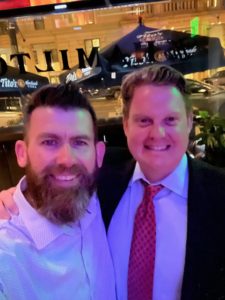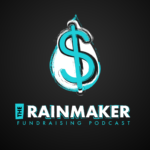
“If we believe so much in our missions and what we’re trying to accomplish, we have a moral obligation to provide the time and space for our employees to get the continuing education necessary to be the best they can at their jobs.”
I loved this quote from Andrew McIndoe, Vice President at The Heritage Foundation, when we got together to talk about the value of infusing B-school thinking into nonprofits.
Like so many industry relationships these days, Andrew and I first met on LinkedIn. But we got the chance to connect over dinner and a nice bottle of wine in his current hometown of Washington D.C. During that dinner, Andrew told me he believed nonprofits could benefit from incorporating business school thinking into their organizations.
We decided to unpack this idea in a recent podcast conversation, where we covered topics like:
- MBA thinking provides broad perspectives and frameworks that we can use to better understand complex issues and challenges, regardless of our sector
- How understanding your own leadership style and the learning styles of those on your team can help you adjust your approach, navigate difficult conversations more effectively, and become a better leader
- How the business school experience can help you more effectively understand and engage major donors and other key partners who are successful business leaders, and where there’s value in this
- How rigorous learning like business school can help you develop a KPI-driven approach to managing your nonprofit organization, and why that’s important to your ability to achieve mission impact
- Why nonprofits are often skeptical of “corporate” leaders who are brought in to “fix” organizations, and why corporate leaders (who are your board members, donors, and other key constituencies) might also be skeptical of those who don’t have business experience — and why we need balanced thinking in this area
- How MBA-level accounting and finance training can help nonprofit leaders navigate and more effectively manage challenging financial situations
- The value of thinking like a CEO, and how B-school programs provide this context
- Why nonprofit CEO’s and boards should double down on continuing education, whether that’s formal MBA programs, certification programs, LinkedIn Learning courses, or anything else
I also asked Andrew to answer three other questions about his own leadership journey and learning.
Q. What advice would you give aspiring fundraisers, based on your own career and what you’ve learned?
A. Don’t be scared of the word “no”, and understand the difference between a “no” and a “hell no”.
Q. What books have you read recently that you’d recommend to other nonprofit leaders?
A. Battle Tested, which distills the leadership lessons learned during the battle of Gettysburg, and How to Win Friends and Influence People, Dale Carnegie’s masterpiece on building relationships.
Q. What’s your most insightful learning from our sector in the last two years?
A. How external factors like the stock market, consumer confidence, and the political environment influence donor behavior, and what we can learn from this.

